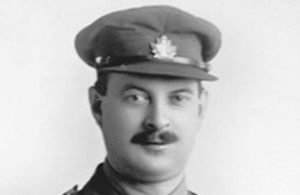WW1 Canadian VC recipient Edward Donald Bellew
The story of Canadian First World War Victoria Cross recipient Edward Donald Bellew.

Edward Donald Bellew [Credit: National Defence Canada]
70 men from Canada received the Victoria Cross, Britain’s highest award for gallantry, during the First World War. As part of the Centenary Commemorations the people of the United Kingdom marked their gratitude to those courageous men by presenting a bronze memorial plaque to their home country engraved with their names. The plaque is now displayed at the British High Commission Ottawa. This archive tells their stories.
Name: Edward Donald Bellew
DOB: 28 October 1882
Place of Birth: Bombay (now Mumbai), India
Date of Action: 24 April 1915
Place of Action: near Keerselaere, Belgium
Rank: Lieutenant
Regiment 7th Infantry Battalion, Canadian Expeditionary Force
Edward Bellew was born on 28 October 1882 in Bombay (now Mumbai), India, and was educated at the Royal Military Academy Sandhurst before serving with the British Army. In 1903, he emigrated to Canada where he worked for the Department of Public Works in British Columbia.
During the First World War, he served with the 7th Battalion, Canadian Expeditionary Force, and he was awarded his Victoria Cross for most conspicuous bravery and devotion to duty on 24 April 1915, near Keerselaere in Belgium during the second Battle of Ypres. As his citation explains:
Capt. (then lieut.) Bellew, as Battalion Machine Gun Officer, had two guns in action on the high ground overlooking Keerselaere. The enemy’s attack broke in full force on the morning of the 24th against the front and right flank of the Battalion – the latter being exposed owing to a gap in the line. The right Company was soon put out of action, but the advance was temporarily stayed by Capt. Bellew, who had sited his guns on the left of the right Company. Reinforcements were sent forward but they in turn were surrounded and destroyed. With the enemy in strength less than 100 yards from him, with no further assistance in sight, and with his rear threatened, Capt. Bellew and Serjt. Peerless, each operating a gun, decided to stay where they were and fight it out. Serjt. Peerless was killed and Capt. Bellew was wounded and fell. Nevertheless, he got up and maintained his fire till ammunition failed and the enemy rushed the position. Capt. Bellew then seized a rifle, smashed his machine gun, and fighting to the last, was taken prisoner.
Bellew remained a prisoner of war until 1919, and left the army with the rank of Captain. After the war he returned to British Columbia where he worked in surveying and construction. He died in 1961.